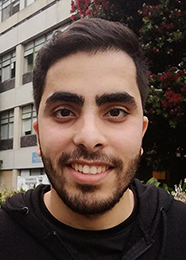Abdelrahman Badarneh is a 2021 finalist in the University of Otago Faculty of Dentistry's DClinDent programme, specialising in Prosthodontics.
Why did you decide to undertake postgraduate DClinDent studies?
I wanted to gain and advance the clinical/research skills and knowledge that will help me to deliver the best service to the patients, and to teach and transfer this knowledge to the students back home as I will be working as an academic in Jordan after completing this programme.
What was it that made you interested in further study in Prosthodontics?
Prosthodontics is a perfect match for my skills and personality. I always loved to restore broken things, solve problems, think laterally and be creative. In addition, compared to other specialties, Prosthodontics gives you the chance to develop that long-term relationship with your patients, follow up your work over long term, and learn new things every day.
Were there specific reasons that you decided to do your postgraduate DClinDent studies at the Otago Faculty of Dentistry?
I joined the DClinDent programme based on Professor Paul Brunton's recommendation. At that time, he was the Dean of the Otago Faculty of Dentistry and one of the external examiners of my final undergraduate oral exams back in Jordan. The excellent reputation of the Otago Faculty of Dentistry and the worldwide recognition of its degrees also greatly encouraged me to make that decision.
What has your postgraduate “journey” been like so far? How was it for you personally? What was good, what was challenging, and what do you feel proud about?
I am very happy with my journey so far. I have improved both as a clinician and as a person. I have learned from the best in the field, developed good relationships with my research and clinical supervisors, my colleagues in the prosthodontics discipline and the other disciplines. The challenge for me, besides being away from my family, was the quick transition from undergraduate to postgraduate studies. Although I had a solid theoretical knowledge, my clinical and research knowledge was limited. I had to spend a lot of time and effort to catch up, but this is what postgraduate study is all about. I feel proud that I have represented my country well, achieved most of what I came here for, and built long-term relationship with my supervisors and colleagues.
How has postgraduate study influenced your work, career or personal life?
in terms of clinical work, the DClinDent programme has improved the way I approach patients, plan treatment, make clinical decisions, execute treatment, follow up and learn from my mistakes. Career-wise, it has equipped me with the clinical and research skills necessary to succeed in my academic career. On the personal level, I developed better time management, organisation and communication skills, and I am more confident and passionate about what I do.
Would you recommend postgraduate DClinDent studies to colleagues, friends or peers? Why?
Based on my positive personal experience, definitely yes. I can see the big difference in my clinical and research skills and knowledge before and after joining the programme. It is totally worth it. The degree is recognised worldwide and allows you to practice in New Zealand and Australia. In addition, the University of Otago is an internationally-recognised research leader in the academic community, with its excellent research infrastructure, internationally recognised staff and wide range of research expertise. Whether you are considering a career as a private specialist or an academic, this programme is the right one for you.
What advice would you give to others about undertaking postgraduate studies at the Otago Faculty of Dentistry?
In terms of clinical work, I would strongly recommend working for at least three years after graduation, with a special focus in prosthodontics. This will allow you to know your strengths and weaknesses, and enter the programme with a clear goal. I would also encourage participating in a research project, and learn the basic research skills as this will help you to excel in the research component of the programme. Finally, postgraduate studies are self-driven. You are the one taking the initiative to learn, setting learning goals and monitoring achieving them. So, ask your supervisors, have discussions with your colleagues both within Prosthodontics and in other disciplines, attend workshops, present your work and listen to feedback.
How did you find interacting with the other students on the paper/programme?
My experience has been very good, not just with my colleagues within my discipline but also in others. We spend a lot of time together as we share the same clinical and study space, which allows us to discuss our research and clinical cases and to have fun sometimes.
How did you find interacting with the staff on the paper/programme?
It has been easy and very helpful. The staff members are very friendly, highly qualified and motivating. I feel that I have built a good relationship with them and I have become friends with some of them as well. As we share the clinic space with the other disciplines, and as the staff offices are on the same level, it has made the staff-student interaction very efficient.

Abdelrahman Badarneh
